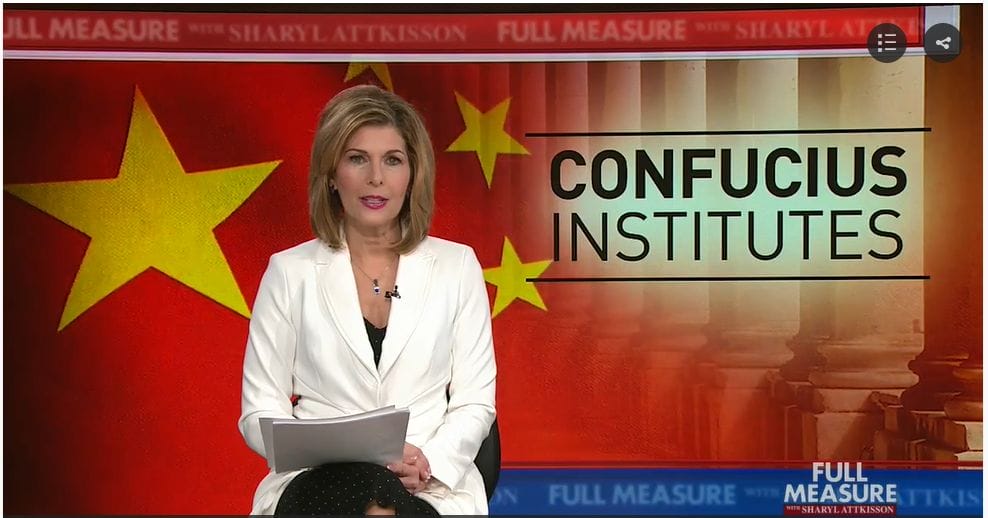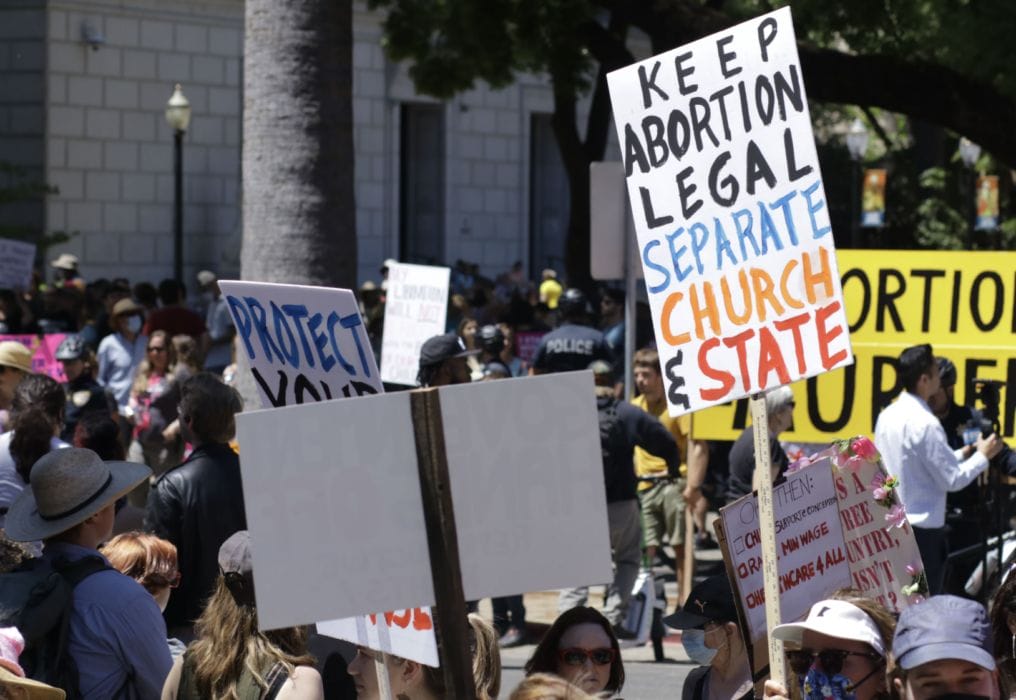Today, a China connection to our colleges. Some are urging American colleges to shut down their China-funded Confucius Institutes. Critic claims the learning centers could be used as tools for China to spy, and influence our students. Defenders say the threat is overblown. Joce Sterman investigates.
Joce Sterman: Far from the violent protests in China-controlled Hong Kong, the trade war between China and the US, and the White House meetings over it all, there’s a quieter, and what some say insidious, China connection.
It’s happening at American schools through a China-backed program called the Confucius Institute.
It’s led by the Hanban, an arm of China’s education ministry, that says Confucius Institutes “aim to protect Chinese language and culture in foreign countries.”
They offer courses in Mandarin, the Chinese language, and host events, like a Beijing opera performance at the George Washington University in Washington DC.
Professor Ed McCord helped create the Confucius Institute there.
Ed McCord: There’s a lot of people in DC that would like to learn Chinese, but doing it through the university is frankly quite expensive. So we can offer an alternative. It’s a kind of educational service that we think is very important.
Joce: Anyone, even non-students, can register to take language classes at the GWU Confucius Institute for about $400.
The Chinese Education Ministry, Hanban, generally provides funding, material and staff for Confucius Institute programs. Since 2006, the Chinese government has spent more than $158 million on schools in the US.
Right now, there are nearly 80 in the US, most at universities and colleges, and even a handful in high schools.
The agreements that govern the relationship between school and Confucius Institute vary widely, meaning the staff, curriculum, rules and transparency are different from school to school.
McCord says, at his university in Washington DC, the Confucius Institute is much like other foreign-sponsored programs across the world.
McCord: The French have programs, the Germans have programs and something that we agree on that if we understand the language of another society better, we are probably going to be able to collaborate with them better.
Joce: But some experts say the Chinese have ulterior motives.
Brig. Gen. Spalding: They’re not just for teaching Chinese and exposing American students to Chinese culture.
Retired Air Force Brigadier General Robert Spalding is a government and national security strategist. He recently wrote a book about China’s influence around the globe.
Brig. Gen. Spalding: One of the things that’s clear that Confucius Institutes aren’t about is academic freedom. Now, who hires the instructors at the Confucius Institute? The Chinese do, not the University.
Joce: Who pulls the strings at Confucius Institutes?
Brig. Gen. Spalding: It is a top down organization. At the end of the day, it’s all driven from this, the top of the Chinese communist party.
Joce: Critics say that means China controls the narrative of the Confucius Institutes and can shut down opposing viewpoints. China has long been known to control the message.
When the NBA’s Houston Rockets General Manager Daryl Morey expressed support for protesters in Hong Kong, China retaliated, pulling contracts and canceling broadcasts, creating a costly international ordeal.
In 2018, a Marriott employee liked a tweet on behalf of Marriott International that supported recognizing Tibet as a country. China fired back, ordering Marriott to stop bookings for its 300 hotels for one week. The employee was fired.
Brig. Gen. Spalding: Then they co-opted all of our institutions, and they said okay, rather than us sending our principles over to them, they’re going to send their principles over to us. And again, Confucius Institutes, the NBA, our corporate leaders, our academic leaders, our political leaders, our Wall Street leaders, are essentially doing things that don’t look anything like the principles and values of the open system that the US is trying to build.
Joce: Congressman Henry Cuellar is leading a charge against that supposed threat, specifically when it comes to Confucius Institutes in his home state of Texas.
Rep. Cuellar: We Americans are very trusting individuals, but we’ve got to understand that there are certain world actors that have certain motives.
Joce: Motives that he says may include stealing our secrets. The Department of Justice recently arrested a GE engineer for conspiring to steal trade secrets to benefit China. In recent years, it’s believed China stole American military blueprints, then used them in China’s fleet.

Visit The Sharyl Attkisson Store today
Unique gifts for independent thinkers
Proceeds benefit independent journalism
And there are concerns that China may carry out similar spying on American campuses, through the Confucius Institute.
In a worldwide threat assessment last year, the Intelligence Community wrote, “China’s intelligence services will exploit the openness of American society, especially academia and the scientific community.”
And FBI Director Christopher Wray has long said the Intel Community monitors the Confucius Institutes.
Christopher Wray: We do share concerns about the Confucius Institutes. We have been watching that development for a while. It is just one of many tools that they take advantage of.
Rep. Cuellar: We have an intelligence community. I will just leave it at that, that I would ask folks, please trust the men and women who do this. And if they have concerns, there’s a reason why.
Joce: Should US universities across the country sever ties with these institutes?
Cuellar: Yes.
Joce: Hands down, not even a question.
Cuellar: Yes.
Joce: But Ed McCord, the professor who helped get the Chinese-backed Confucius Institute up and running at George Washington University, says the concerns are all smoke and no fire.
Joce: Do you think there is the potential for espionage in these institutes?
McCord: Absolutely not. People who would have nothing to do with Confucius Institutes are bringing their biases to assume the Chinese must be doing these things and therefore it must be true because I heard somebody else say that it must be true, kind of echo chamber.
Joce: A recent report by Stanford’s Hoover Institution didn’t endorse shutting down Confucius Institutes, but recommended greater transparency and consistency among schools hosting them. Now, America’s universities face a choice of whether to keep the institutes, or shut them down.
Tufts University recently renewed the contract on its Institute, saying it found no undue influence by China.
McCord says it’s up to each school to maintain control and push back if needed.
McCord: If they say something like, you do this or we’ll do that, they just say no. And that’s what we’ve all become accustomed to doing. And so that’s why I don’t see it’s a problem.
Joce: A choice, General Spalding says, has consequences well beyond the classroom.
Brig. Gen. Spalding: We can share the openness of our society, but we should only share it with those nations that want to promote freedom, democratic principles, human rights.
We contacted dozens of schools and none of them agreed to an on-camera interview. This month, Senator Chuck Grassley sent a letter to all schools that host Confucius institutes, asking them to request a briefing with the FBI, to understand the possible threat.
https://fullmeasure.news/news/cover-story/confucius-institutes




There are local high schools here in Michigan that we’re going to have Chinese sponsored Mandarin classes, despite some objections. Though some retained the Mandarin classes, others dropped them like a hot potato with no public explanation.
I’m no fan of the ChiComs, and I see China as far-and-away our greatest threat to national security. Yet, this article gives me nothing beyond suspicions as to how these institutes are subverting American interests or advancing ChiCom Party interests. What facts are given in this article that I can use to debate the legitimacy of these university programs? When an article is devoid of facts, it is an opinion piece; in this case the opinion of Joce Sterman and Brig. Gen. Spalding. With them, I too am suspicious of the purpose of this program. But suspicion isn’t news, nor does it help to educate those readers who seek to protect our nation by calling out the enemies within. To take action, there needs to be actionable intelligence. This article gives us nothing to act on or debate the issue with.
Two tangents
1. A friend taught ESL and was recruited to lead a school for Chinese students within a private Massachusetts school. (He declined.) He told me there are many such schools in MA– Chinese parents want to give their children a leg up on getting into American Universities (and Boston is loaded with them). There are so many wealthy Chinese families that have moved to Boston suburbs that there are large Chinese book/video sections in the public libraries, realtors to specialize in Chinese clients and there has been some contention with the architectural purists/historical societies when the Chinese want to change an antique house’s interior to their tastes. The Boston suburbs tend to be liberal and very open to foreigners generally (myself included) but it has gotten to the point where people are beginning to resent their presence.
2. Sharyl A, can you unpack what General Pompeo is saying here to the Governor’s Council, about a governor’s status (friendly/hostile/ambiguous)?
https://www.thegatewaypundit.com/2020/02/busted-secretary-of-state-pompeo-speaks-to-us-governors-says-china-has-a-list-of-sell-out-governors-and-he-has-seen-it-video/
Would a friendly governor be willing to allow Chinese spies in in order to spy on American businesses, for instance? Is this something you’d be willing to investigate? I feel hampered by naivte in this as I tend to be welcoming.
I do agree with Xospela, above, I would have liked to see *specifics*. Just why do the people see Confucious Institutes as a threat– what have they seen go on, or suspect could go on? Also ondering about that Harvard Professor who recently got arrested. This really needs A LOT more attention. Maybe the MA governor is a “friendly” governor? ;-)